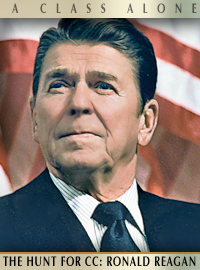
|
Cursing the whole enterprise just because you can’t find his [Ronald Reagan's] carbon copy is akin to writing off a Super Bowl win because you didn’t have a perfect season.
|
|
| Hoping that Newton’s laws of physics apply with equal predictability to politics, conservatives have spent the prologue to the 2012 presidential race anxious to believe that for every action there is an equal and opposite reaction. That seemed to be one of the lessons of the 2010 midterm elections, when the utopian liberalism of Barack Obama and his congressional allies, ascendant for the past two election cycles, was put in check by the widespread success of a crop of GOP candidates more conservative than any since the Republican Revolution of 1994.
For many Republican voters, the hope is that a countervailing force of equal strength will materialize in the presidential election – and that conservatives will be able to find a figure who can imbue them with as much quasi-messianic hope as Barack Obama gave to liberals in 2008. They haven’t found that candidate yet, and with filing deadlines quickly approaching for the upcoming primaries and caucuses, the hope that they will is declining at terminal velocity.
Thus it was with considerable distemper that conservatives reacted to Tuesday’s news that New Jersey Governor Chris Christie – who has consistently rebuffed all efforts to drag him into a race for the White House – was definitively closing the door on a presidential bid. Christie may be the last potential candidate to leave Republicans at the altar (although the perpetually unpredictable Sarah Palin remains a question mark), but he was certainly not the first. Figures ranging from Indiana Governor Mitch Daniels to Wisconsin Congressman Paul Ryan to former Florida Governor Jeb Bush have all been posited as possible Republican saviors. All have eventually decided against a run.
This leaves conservatives with a field of candidates that they have become all too willing to criticize as insufficient for the task of recapturing the White House. Mitt Romney is seen as too inauthentic and tarnished by the health care bill he signed while Governor of Massachusetts. Rick Perry is criticized as a ham-handed communicator and a soft touch on immigration issues. Michele Bachmann and Herman Cain, both of whom have experienced brief honeymoons with a polyamorous conservative base, are criticized for being inexperienced and/or unelectable.
Many of these criticisms have merit – and they are essential to the distillatory process of a primary season. But conservatives go too far when they make the perfect the enemy of the good, allowing these demerits to drag them into a state of existential despair. The reality is that, in a nation that is turning on President Obama at a rapid pace, any Republican strong enough to emerge from the primary season will be competitive to win the general election. And any Republican who meets that criterion will also represent such a dramatic improvement over the current inhabit of the Oval Office as to not merit comparison.
It represents a healthy political idealism for Republicans to search for the second coming of Ronald Reagan. But it’s a bit tiresome when they become inconsolable at his absence. Reagan was of a class alone, not only in his combination of political skills and ideological bearings, but also in the way that his abilities uniquely met his moment in history. Cursing the whole enterprise just because you can’t find his carbon copy is akin to writing off a Super Bowl win because you didn’t have a perfect season.
There’s another shortcoming at work here: the idolatry of the presidency. While figures like Christie and Ryan are certainly among the leading lights of the conservative movement, their current day jobs aren’t exactly afterthoughts. As Chairman of the House Budget Committee, Ryan is liable to be the intellectual point man for the sort of comprehensive entitlement reform that could keep the nation from collapsing into a morass of debt – a role that will make him an irreplaceable ally for a potential Republican president. Likewise, Christie is engaged in a major reform effort in the deep blue state of New Jersey – a fact he cited in opting against a presidential run – where he is pitted against powerful entrenched interests like the state’s public employee establishment. For conservatives who believe in the Tenth Amendment’s limit on federal powers – and the correlative responsibility for policy innovation to happen at the state level – that should be a task from which they’re not eager to drag him away.
Conservatives can breathe a bit easier about the 2012 presidential race. For, regardless of who the Republican nominee is, the race will transcend the individual candidates. It will be a grand ideological contest for the affections of the American spirit – with free enterprise, limited government and personal responsibility on one side and coercion, statism and centralization on the other. That is a fight any Republican with a functioning frontal lobe should be able to win. And when he does, the Paul Ryans and Chris Christies of the world will have his back – and ours. |

























